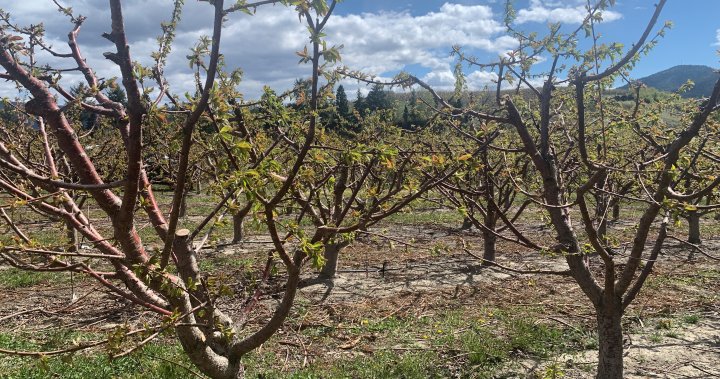Cherry growers in British Columbia are facing significant challenges this year due to the extreme cold that hit the region during the winter. The damage inflicted on cherry buds has now become apparent, with many trees not producing any blossoms. This has resulted in a disastrous situation for farmers, with many orchards not expected to yield a crop this year. The president of the B.C. Cherry Association, Sukhpaul Bal, described it as the worst he has ever seen, with his own 85 acres of cherry trees at Hillcrest Cherries orchard not expected to produce a harvest.
The lack of blossoms on cherry trees has led to a difficult decision for growers, such as Deep Brar, who has about 100 acres of cherries at his Summerland orchard. Abandoning a crop is not only financially costly in terms of lost income, but there are also expenses involved in maintaining the orchards even if no harvest is expected. Bal and other growers have been advocating for emergency funding to help soften the blow of this year’s losses, as the existing programs are not designed to support farmers dealing with consecutive extreme weather events year after year.
Despite a historic $70-million investment announced by the Ministry of Agriculture and Food to help B.C. fruit and grape growers replace damaged crops by replanting hardier, climate-resilient varieties, cherry growers are still facing immediate challenges. The investment aims to help many cherry growers in the long term, but Bal believes it does not address the urgent situation at hand. He is hoping for emergency relief from the province to help farmers get through this difficult season, as replanting healthy trees may not be a viable solution in the short term.
Bal emphasized the need for immediate support, as the current situation is unprecedented and existing programs are not equipped to handle the consecutive extreme events that have affected cherry growers. He pointed out that the programs are not designed to provide assistance year after year dealing with such challenges, which can lead to diminishing coverage for farmers producing less fruit. Bal’s orchard and many others are at risk of not having a cherry crop this year, highlighting the urgency of the situation and the need for government intervention to help farmers weather this crisis.
The lack of blossoms on cherry trees has left growers like Brar contemplating the future of their orchards, with the difficult decision of whether to abandon the crop or continue to maintain the trees with no expectation of a harvest. While some may see it as an opportunity to have a “summer off,” the reality for growers is that they still have to incur costs for upkeep and maintenance without any income from the harvest. The uncertainty of the situation has prompted growers to seek emergency funding to help them navigate this challenging season and potentially recover in the following year.
Despite the challenges faced by cherry growers in British Columbia this year, there is a sense of resilience and optimism among the farming community. While immediate relief is needed to address the current crisis, farmers like Brar remain hopeful that with support from the province, they can overcome the challenges of this season and look forward to a better harvest next year. The ongoing advocacy efforts by Bal and other growers aim to ensure that the government recognizes the importance of the agricultural sector and provides the necessary assistance to help farmers recover from the impact of extreme weather events.


